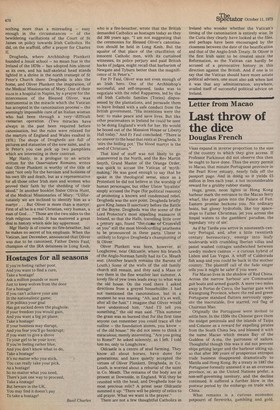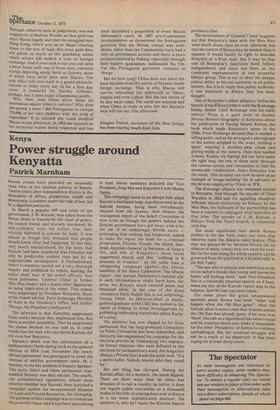Letter from Macao
Last throw of the dice
Douglas French
Visas expand in inverse proportion to the size of the country to which they give access. If Professor Parkinson did not observe this then he ought to have done. Thus the entry permit to Macao, that minute Portuguese province in the Pearl River estuary, nearly falls off the passport page. And in doing so it yields £5 million in fees each year, a not inconsiderable reward for a grubby rubber stamp.
Huge, green, neon lights in Hong Kong harbour mark the entrance to the Macao ferry wharf, like pier gates into the Palace of Fun. Eastern promise beckons. you. No ordinary boats, but glossy hydrofoils, like toy spaceships to Father Christmas, jet you across the limpid waters to the gamblers' paradise, the legendary 'city of sin'.
As if by Tardis you arrive in nineteenth-century Portugal, and, after a little twentieth century bureaucracy, emerge into leafy boulevards with crumbling Iberian villas and pastel washed cottages sandwiched between tawdry modern casinos — a curious hybrid of Lisbon and Las Vegas. A whiff of Caldeirada fish soup and you could be back in the mother country. The plaintiff call of the fado singer tells you it might be safer if you were.
For Macao lives in the shadow of Red China. Across the narrow harbour are Communist gun boats and armed guards. A mere two miles away is Portas de Cerco, the barrier gate with Kwangtung Province, where the red and green Portuguese standard flutters nervously opposite the inscrutable, five starred, red flag of Chairman Mao.
Originally the Portuguese were invited to settle here. In the 1550s the Chinese gave them the midget peninsula and the islands of Taipa and Colaone as a reward for expelling pirates from the South China Sea, and blessed it with the name Macao which means Bay of the Goddess of A-ma, the patroness of sailors. Thoughtful though this was it did not prevent ships getting larger and the harbour silting up, so that after 300 years of prosperous entrepot trade business disappeared dramatically to Manila and Hong Kong. By a treaty in 1887 the Portuguese formally annexed it as an overseas province, or, as the United Nations prefer, a non-self-governing territory, and the decline continued. It suffered a further blow in the postwar period by the embargo on trade with China.
What remains is a curious economic potpourri of fireworks, gambling and gold. Portugal, either by luck or judgement, was not a signatory at Bretton Woods, so that gold can enter Macao legally and then be smuggled into Hong Kong, which acts as an illegal clearing house to the rest of Asia. But even gold does not glitter as much as the gambling tables which attract £35 million a year in foreign exchange. And if your luck is out you can send a letter home with one of those nice, coloured stamps depicting exotic birds or flowers, most of which have never been near Macao. The post office falls over itself in a grand philatelic cascade to make every day fit for a first day cover. A headache for Stanley Gibbons, Perhaps, but it does make a handsome profit.
Why, then, does China allow these six anomalous square miles to survive? Why does she permit a mere 7,000 Portuguese to corrupt 270,000 of her own Children with the evils of ,capitalism? If so minded she could swallow Macao in one afternoon. In 1962 she insisted on her territorial waters being respected and has
since demanded a proportion of every Macao fisherman's catch. In 1967 pro-Communist revolutionaries so threatened the Portuguese governor that the British consul was withdrawn. Since then the Communists have had a veto on government actions and there is more pressure exerted by Peking, especially through their bizarre spokesman, millionaire Ho Yin. Yet the Portuguese governor remains in charge.
But for how long? China does not force the issue because even the purest of Maoists needs foreign exchange. That is why Macao will survive unscathed the upheavals in Timor, Angola and even Lisbon. But the last throw of its dice must come. The cards are stacked and when China is ready to play her ace Macao's luck will run out. One afternoon.
Douglas French, secretary of the Bow Group, has been touring South East Asia



































 Previous page
Previous page